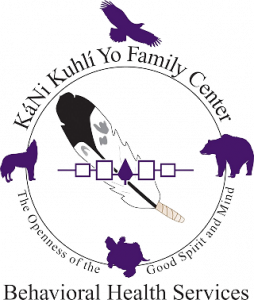Substance Use Services
Levels of Care
When someone you love (including yourself) is struggling with substance use, it can be hard to know where to begin when looking for help and what to expect along the way. Oneida Behavioral Health is a great starting point. We’re here to help you navigate the choices that will best support your long-term success. It’s important to note that each level of care plays a distinct role in the treatment process. Keep reading to learn more.
What is treatment?
Despite the picture that television may portray, treatment is so much more than simply a stay at a rehab center or detox facility. Treatment is all about finding the right combinations of therapies to support an individual’s recovery over years and decades. The right treatment option is one that provides a strong foundation for an individual’s long-term recovery and ultimately leads to a healthier life.
Treatment looks very different for everyone. It can include outpatient services such as harm reduction, therapy, recovery coaching, support groups, medication assisted treatment and more. In very specific circumstances treatment can also include a detox facility or a residential treatment center.
When to begin treatment?
As simple as this question sounds, its answer is a key factor in a successful path to recovery. As much as we want someone to seek help for substance use, neither a loved one nor a treatment provider can force treatment upon someone. The best time for someone struggling with substance use to begin treatment is when they are ready. This is why Oneida Behavioral Health offers harm reduction options, like naloxone and fentanyl or xylazine test strips, to help keep people alive until they are ready to walk the path to recovery.
What treatment options are there?
When it comes to treatment, there are different levels of care that are appropriate in different situations.
- Outpatient Treatments (to learn more about these services, see the tabs at the top of this page)
- Same Day Substance Abuse Care
- Substance use or co-occurring counseling
- Group education series for various stages of recovery
- Intensive Outpatient Therapy
- Medication Assisted Treatment (MAT)
- Recovery coaching
- Medically Monitored Residential Treatment
- Transitional Residential Treatment Service
- Medically Supervised Detox
How do I determine the bests option for treatment?
We encourage individuals to begin by talking to a professional at Oneida Behavioral Health for a complete evaluation. The following aspects are considered when assessing the need for specific types of treatment:
- Level of support needed: The intensity of care required to address the individual’s needs, ranging from outpatient to more intensive, inpatient care.
- Any co-occurring mental health concerns: identifying and addressing any mental health issues that exist alongside the primary condition to ensure comprehensive treatment.
- Harm reduction: Strategies aimed at reducing the negative consequences of risky behaviors, rather than solely focusing on cessation.
- Transportation and location: Considering the accessibility of treatment for each individual.
- Family involvement in treatment: Evaluating the role of family support and participation in the treatment process to enhance recovery outcomes.
Other factors to consider
- A more holistic approach to recovery can provide additional benefits. Oneida Behavioral Health is unique in its cultural focus, incorporating traditional Oneida practices and trauma-informed care.
- It may take many attempts to succeed in a recovery journey. Successful recovery requires that you are kind to yourself and that you always keep trying.
- If you are a friend or loved one of someone struggling with substance use, you are not alone. Oneida Behavioral Health can help you learn how to process what you’re feeling and can connect you with groups like Oneida Nar-Anon, where you can speak with others in a safe, confidential environment who have experienced similar challenges.
Take the first step
We encourage you to reach out to Oneida Behavioral Health for help determining what your best first step is in your recovery journey. We can connect you to the outpatient services that best suit who you are. If circumstances call for inpatient treatment, we can help connect you with various options. If you aren’t ready to speak to someone, you can find links to other self-help resources here.
Oneida Behavioral Health’s same day substance abuse care is available Monday through Friday between the hours of 8:00 a.m. and 11:00 a.m. (you must be present by 10:00 a.m.). Care is available on a first come, first served basis at 2640 West Point Road, Green Bay, WI 54304.
Oneida Behavioral Health deeply appreciates the importance of having the right types of services available for our community. This is why we have conducted a Treatment Facility Study to learn more about the feasibility of different types of facilities here in Oneida. Learn more about the study and the specific types of inpatient treatments here. We look forward to sharing an update once a path forward has been outlined.
Same Day Substance Abuse Care
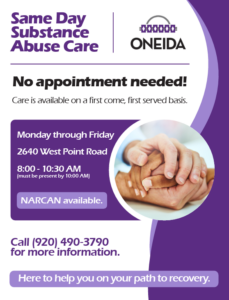 For those seeking treatment for substance abuse, Oneida Behavioral Health offers same day substance abuse care Monday through Friday between the hours of 8:00 a.m. and 11:00 a.m. (you must be present by 10:00 a.m.). Care is available on a first come, first served basis at 2640 West Point Road, Green Bay, WI 54304.
For those seeking treatment for substance abuse, Oneida Behavioral Health offers same day substance abuse care Monday through Friday between the hours of 8:00 a.m. and 11:00 a.m. (you must be present by 10:00 a.m.). Care is available on a first come, first served basis at 2640 West Point Road, Green Bay, WI 54304.
NARCAN® is also available. To learn more, please call (920) 490-3790. Everyone deserves to and can recover from substance abuse.
Triage Counseling
Triage Counseling is an assessment conducted at a client’s point of entry to health services which aims to categorize the urgency of mental health related problems. This involves the client receiving an initial screening evaluation and those classified as urgent (e.g., a danger to self or others, severe or psychotic symptoms) are given priority appointments.
Included in Triage Counseling are:
- Assessing the initial needs of the clients
- Scheduling initial intake appointments
- Providing back up for med management
- Completing suicidal assessments
- Meeting with clients in times of crisis when a therapist is not available
- Allowing for client walk-in services for a needs assessment
“Being able to speak directly with someone…immediately truly helped me through my current situation.
A calm empathetic person listening…Made it possible to make it until my appointment.”
– an OBH client
Therapy
“Emma definitely helps keep me going. I don’t know where I’d be without her. I feel safe talking to her.”
– an OBH client
At Oneida Behavioral Health, we aim to provide a safe and supportive space for individuals to manage stress, explore challenges, develop coping strategies and achieve self-growth. Our therapy services aim to help with issues that are hard to face alone. Through our services and resources, we hope to assist people in overcoming obstacles to their well-being.
Therapy has numerous positive benefits, including increasing compassion and self-esteem. Therapy can also help you develop coping strategies or emotional resilience to navigate mental health challenges. Learning and employing these crucial skills can make it easier to handle difficult situations, make healthy decisions and reach goals. Therapeutic journeys can help increase self-awareness and can contribute to self-growth. Therapy is also called psychotherapy, psychosocial therapy, talk therapy or counseling.
If you or a loved one could benefit from these services, Oneida Behavioral Health has a variety of therapy options to meet your needs. These include:
Individual Therapy: A trained professional helps an individual work through personal matters and obstacles they are facing. It is an effective treatment for a variety of life challenges, emotional difficulties and mental illnesses. Individual sessions are available for clients aged five (5) and older.
Couples Therapy: Designed with the goal of resolving relationship-based problems, couples therapy aims to improve and strengthen relationships through open and honest communication. It has the goal of building trust and understanding between spouses or significant others.
Family Therapy: Multiple family members can participate in this type of counseling, allowing the opportunity to resolve conflicts through open communication and navigate challenging times together.
Child Therapy: The health of a child and their family can be affected by emotional and mental health stress. Counseling can help families grow stronger together and children to grow into strong, healthy adults. Counseling can help a child and family learn:
- About their moods, feelings, thoughts and behaviors
- Good communication skills at home and at school
- How to work through problems and try new solutions in a safe space
- How to deal with trauma and address behavior challenges
Brainspotting:
“Where you look affects how you feel”
The brain is an incredible processing machine that digests and organizes everything we experience but trauma can overwhelm the brain’s processing capacity, leaving behind pieces of the trauma, frozen in an unprocessed state. Brainspotting (BSP) can minimize the influence of trauma, unpleasant emotions and uncover thinking patterns that are keeping a person stuck. Memories are not lost, but the “emotional charge” from the memory or the nonproductive thinking pattern will be cleared.
Those who have experienced either physical or emotional trauma, feel blocked in making progress in goals or performance, or challenged with faulty core beliefs may obtain benefit from BSP. This form of therapy has been shown to be an effective treatment option for those experiencing:
• All forms of trauma (& PTSD)
• Anxiety
• Attention issues (ADHD)
• Anger issues
• Phobias
• Substance abuse
• Chronic fatigue and chronic pain
• Impulse control issues
• Sports performance issues
• Eating disorders
The BSP trained clinician will ask you to choose an ‘issue’ that you would like relief from. While thinking about the issue, the clinician will ask you to share where in your body you feel the issue. You’ll be asked to rate the intensity of your feelings on a scale from 1-10. The clinician will lead you in an eye scan to find the position that seems to be strongly connected to this issue. After that, a rapid processing of memory, body responses, or verbal processing occurs, which results in the desired outcome– the issue gets resolved on a deeper level than talk therapy would allow.
Click here to watch a brief video about Brainspotting featuring David Grand, Ph.D.
“The comfort and ease of my appointment with Melissa was hands down perfect.”
– an OBH client
Co-Occurring Disorders
Co-Occurring Disorders, also known as dual diagnosis, refers to the presence of both a mental health condition and a substance use disorder. These conditions often interact in ways that can intensify symptoms, making integrated treatment an essential tool. Oneida Behavioral Health is here to provide services to clients experiencing a dual diagnosis.
Some of the most frequently seen combination include depression and alcohol use disorder, anxiety and stimulant misuse or PTSD and opioid dependence. Each individual’s experience is unique, and treatment is tailored accordingly.
Treating both conditions at the same time leads to better outcomes. Our team uses evidence-based approaches that address the emotional, psychological and physical aspects of both mental health and substance use challenges.
A path toward recovery is possible, and we are here to help you on your journey. With the right support, individuals with co-occurring disorders can achieve stability, improve their quality of life and build a future rooted in wellness and resilience.
Brainspotting:
“Where you look affects how you feel”
The brain is an incredible processing machine that digests and organizes everything we experience but trauma can overwhelm the brain’s processing capacity, leaving behind pieces of the trauma, frozen in an unprocessed state. Brainspotting (BSP) can minimize the influence of trauma, unpleasant emotions and uncover thinking patterns that are keeping a person stuck. Memories are not lost, but the “emotional charge” from the memory or the nonproductive thinking pattern will be cleared.
Those who have experienced either physical or emotional trauma, feel blocked in making progress in goals or performance, or challenged with faulty core beliefs may obtain benefit from BSP. This form of therapy has been shown to be an effective treatment option for those experiencing:
• All forms of trauma (& PTSD)
• Anxiety
• Attention issues (ADHD)
• Anger issues
• Phobias
• Substance abuse
• Chronic fatigue and chronic pain
• Impulse control issues
• Sports performance issues
• Eating disorders
The BSP trained clinician will ask you to choose an ‘issue’ that you would like relief from. While thinking about the issue, the clinician will ask you to share where in your body you feel the issue. You’ll be asked to rate the intensity of your feelings on a scale from 1-10. The clinician will lead you in an eye scan to find the position that seems to be strongly connected to this issue. After that, a rapid processing of memory, body responses, or verbal processing occurs, which results in the desired outcome– the issue gets resolved on a deeper level than talk therapy would allow.
Click here to watch a brief video about Brainspotting featuring David Grand, Ph.D.
“Jamie is very kind and I feel very comfortable speaking to her. Thank you”
– an OBH client
Hub and Spoke - A Comprehensive Approach
Under the Hub and Spoke model, Oneida Behavioral Health serves as the lead, or “Hub” agency, in cooperation with contracted providers that serve as the “Spokes,” providing additional support.
This program is focused on Medicaid-eligible youth and adults with severe substance abuse disorders who are at high-risk for chronic physical and mental health issues. It is the Hub’s role to provide access to specialized substance abuse programs and support, including assessments, medication-assisted treatment and ensuring that a person’s overall behavioral needs are met. The Spokes then provide additional support services and care management following assessment and stabilization.
This model shows great promise of making a true difference in the lives of those dealing with substance abuse, because the approach offers a coordinated and comprehensive array of services including:
- Care Management – individuals are identified for treatment, followed by initial assessment and development of a personalized plan of care.
- Care Coordination – the plan of care is implemented through referrals, coordination and follow-up with all providers and treatment operations.
- Transitional Care – assures smooth movement of individuals from one treatment setting to another; between health care providers and between levels of care.
- Connections to Community and Social Support Services – connecting the individual to medical, behavioral, educational, community and social support services is vital to ongoing recovery efforts.
- Health Promotion – healthy behaviors are modeled and encouraged, including self-management of health, mental health and addiction issues.
- Individual and Family Support – a strong support network is needed and encouraged on the road to recovery.
For more information about Hub and Spoke, contact Oneida Behavioral Health at (920) 490-3790.
Program provides better access to mental health services (spectrumnews1.com)
Alcohol Abuse Awareness
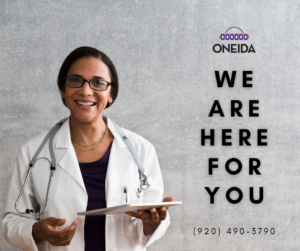
If you or a loved one is abusing alcohol, we are here to help. The clinical staff at Oneida Behavioral Services are ready to provide education, support, and treatment to clients who are affected by problem drinking. How can you tell if drinking is a problem? Start by asking yourself or your loved one the following questions:
- Have you ever felt you needed to cut down on your drinking?
- Have people annoyed you by criticizing your drinking?
- Have you ever felt guilty about drinking?
- Have you ever felt you needed a drink first thing in the morning (“eye-opener”) to steady your nerves or to get rid of a hangover?
Answering “yes” to two or more of the above questions may be a sign that alcohol use is a problem. The medical providers at Oneida Behavioral Health recommend that if you chose to drink, that it be in moderation. This means no more than 1-2 drinks per day for men and 1 drink a day for women. One drink can equal:
- 12 ounces of regular beer, which is usually about 5% alcohol
- 5 ounces of wine, which is typically about 12% alcohol
- 1.5 ounces of distilled spirits, which is about 40% alcohol
Individuals who are ages 21 and younger, pregnant women, and those who have health problems such as diabetes, heart disease and liver disease should avoid alcohol. Also, please talk with your doctor if you take prescription or over the counter medication, as it may be dangerous to combine them with alcohol. There is help and support available at Oneida Behavioral Health. Our team can provide the following services to our registered clients:
- Confidential assessments and screening
- Patient/family education
- Referrals to inpatient, detox and intensive outpatient treatment
- Individual or family counseling
- Information on AA meetings, Al-Anon meetings and other community supports
- Support for those who have a loved one who is using/abusing alcohol
- Individualized treatment planning
For more information on how Oneida Behavioral Health can help, call (920) 490-3790 or (920) 490-3860 and ask to speak with a Triage Counselor. We are here to help.
Tobacco Abuse
While traditional tobacco is a sacred and medicinal plant to the Oneida people, commercial tobacco contains many chemical additives that can cause cancer.
Why Is Commercial Tobacco a Concern?
Use of commercial tobacco, particularly smoking, is one of the leading causes of preventable illness and death worldwide. The chemicals in commercial tobacco products create a physical dependency that can be difficult to break. Choosing to quit commercial tobacco can lead to improved health, better mental health, increased energy and overall enhanced quality of life.
How Can Oneida Behavioral Health Help?
At Oneida Behavioral Health, our counseling and therapy services can help you quit commercial tobacco:
Individualized Counseling: Our licensed counselors offer personalized support, helping you understand the root causes of your tobacco use and develop healthier coping strategies.
Cognitive Behavioral Therapy (CBT): This evidence-based therapy helps you change the thoughts and behaviors that fuel your dependance on tobacco.
Support for Co-occurring Mental Health Issues: Since many individuals with mental health challenges smoke at higher rates, we provide integrated care to address both your mental health and tobacco use simultaneously.
Relapse Prevention Support: Overcoming tobacco dependence can be a long-term process. Our counselors work with you to develop tools and strategies for preventing relapse, helping you stay focused on your goal.
At Oneida Behavioral Health, we are committed to helping you overcome dependence on commercial tobacco with the support and resources you need. Contact us today to learn more about how we can help you restore balance in your life.
Gambling Assistance
 Compulsive gambling is a progressive disorder causing a psychologically uncontrollable preoccupation and urge to gamble. This results in excessive gambling, which can disrupt or damage personal, family and work relationships and endeavors. Compulsive gambling is recognized by the American Psychiatric Association as an impulse control disorder.
Compulsive gambling is a progressive disorder causing a psychologically uncontrollable preoccupation and urge to gamble. This results in excessive gambling, which can disrupt or damage personal, family and work relationships and endeavors. Compulsive gambling is recognized by the American Psychiatric Association as an impulse control disorder.
Are you a compulsive gambler?
Only you can decide whether or not you are a compulsive gambler. The disorder can impact people from all walks of life. The following questions can help you determine whether you may want to reach out for assistance:
– Have you ever lost time from work or family events due to gambling?
– Has gambling affected your reputation?
– Do you often gamble until your last dollar is gone or have you ever sold anything to finance gambling?
– Has gambling ever impacted your personal welfare or that of your family?
– Has gambling every disrupted your sleep?
– Do you use gambling to escape worry or trouble or to celebrate good fortune?
If you found yourself answering “yes” to more than a couple of these questions, you may want to reach out for help. Compulsive gambling can be as debilitating as an alcohol or drug addiction, but it can also be diagnosed and is a treatable disorder. It’s estimated that five to seven percent of Wisconsin residents are compulsive gamblers. You are not alone. If you believe you can benefit from gambling assistance, please reach out to Oneida Behavioral Health at 920.490.3790.
Insights Group
The Insights Group is an 8-week education series on substance use and recovery. The Insights Education Group meets Tuesdays from 5:00 to 7:00 p.m.
Topics Include:
• Understanding Substance Use Disorders
• Stages of Change
• Consequences of Substance Use
• Addictive Thinking
• Relapse Prevention
• Physical Effects of Substances
• Post-Acute Withdrawals & Cross Addiction
• Recovery & Resources
This group may be recommended to you before going into Discovery Group if you have had no prior treatment. Or, your therapist may recommend Insights Group as an addition to individual therapy because the education would benefit you.
Transformations Group - DBT for Recovery
The Transformations Group is a 12-week psychoeducation group that will help you build skills to promote recovery and build a life worth living. This group meets Mondays between 9:30 and 11:30 a.m.
The goal of Dialectical Behavior Therapy (DBT) is to learn skills for changing unwanted behaviors, emotions, thoughts and events that cause misery and distress. We hope to help you improve your quality of life by helping you build the following skills:
Core Mindfulness.
Learning to stay in the moment, observe within and outside of oneself, and use Wise Mind to do what is best in a given moment.
Interpersonal Effectiveness.
Improving coping skills, building assertiveness skills, determining what is important in relationships, and how to increase the likelihood that your needs are met.
Emotion Regulation.
Learning to regulate ones feelings, name emotions, reduce impulsivity, and discover feelings through emotional growth.
Distress Tolerance.
Developing new skills to soothe oneself and increase ones ability to tolerate distress and crisis effectively, while also recognizing that stress is a part of life.
Transformations brochure
Transformations flyer
If you are interested in participating in this group, please talk to your primary therapist about a referral.
DBT Skills Group
Dialectical Behavior Therapy (DBT) is a type of talk therapy that emphasizes the importance of accepting the past while striving for an improved future. It helps individuals strike a balance between the two contradictory concepts of accepting yourself as you are and recognizing the need for change. DBT skills training can help individuals regulate emotions, build stronger relationships and reduce stress, leading to an increased sense of fulfillment.
Oneida Behavioral Health’s DBT Skills Group is a weekly two-hour group session in which you can learn DBT skills and how to apply them. It is led by two trained DBT facilitators/leaders and covers four modules: mindfulness, interpersonal effectiveness, emotion regulation and distress tolerance. The group takes place over 21 (or more) weeks and incorporates a cultural learning component each month.
If you are interested in being part of the DBT Skills Group, ask your therapist to provide a referral (participants must be receiving therapy at OBH). A DBT coach will then provide an orientation to the program. Expectations include attending weekly group sessions, completing weekly homework and additional coaching, if needed.
The Four Modules of DBT (21+ weeks):
- Mindfulness: This is the practice of being fully aware and focused in the present instead of worrying about the past or future.
- Interpersonal effectiveness: This means understanding how to ask for what you want and need, as well as setting boundaries while maintaining respect for yourself and others.
- Emotion regulation: This focuses on understanding, being more aware of and having more control over your emotions.
- Distress tolerance: This involves understanding and managing your emotions in difficult or stressful situations, without responding with harmful behaviors.
DBT Skills Group Times:
Morning DBT on Tuesdays from 9:00 until 11:00 a.m.
Afternoon DBT on Tuesdays from 2:30 until 4:30 p.m.
Listen as Dr. Marsha Linehan explains why learning DBT skills can help.
In this video, Dr. Marsha Linehan answers the question…Are DBT Skills for Everybody?
Discovery Group - Intensive Outpatient Therapy
The Discovery Group meets Tuesday, Wednesday and Thursday evenings from 3 p.m. to 6 p.m. Criteria to participate in the Discovery group includes:
- *Clients who are in Contemplation stage or higher.
- *Clients in Pre-Contemplation and have completed Aware/Reality Group.
- *Clients who have recently (within 6 months) completed inpatient treatment.
- *Clients will be informed that Discovery Group is a minimum of 18 sessions based on their progress.
*Clients are expected to complete a minimum of 4 support group options while in group, and Report Forms will be provided to include: where, when, what did you learn, etc.
The length of group time is individualized and based on:
- *Notable progress in Stage of Change.
- *Complete support group requirements.
- *Complete Circle of Life and Step 1 assignments.
- *Maintain abstinence during the vast majority of group.
- *Completed relapse prevention plan.
*Clients are expected to complete a minimum of 4 support group options while in group, and Report Forms will be provided to include: where, when, what did you learn, etc.
Journey Group - Aftercare Therapy
Aftercare therapy provides essential, ongoing support for those on the path to recovery. Journey Group meets on Wednesdays from 5:00 until 8:00 p.m. Clients must meet one of the bulleted criteria below to participate in Journey Group:
- Have successfully completed Discovery Group, and are in the Preparation/Action Stage of Change.
- Have recently completed (within past 6 months) an inpatient treatment program, and who are in the Preparation/Action Stage of Change. It is desirable that they complete at least 2 weeks of Discovery group before entering Journey Group.
Note: The client must have a completed relapse prevention plan prior to engaging in Journey Group. This may be completed with the primary counselor during the course of Discovery Group. A copy will be made for the Journey Group facilitators.
Participation in the Journey group will include the following:
- Client will be informed that Journey Group is a minimum of 16 sessions, based on client progress.
- They are expected to maintain sobriety during this time.
- 2 Family Days are mandated in order to complete this group.
- Clients will continue in support group options (minimum of 2 per week), and provide reports each week. (see below)
Support Group Options
OBH partners with a variety of area support groups that allows the client to participate in one that best fits them and their journey to recovery. These include:
- Sweat lodge, longhouse, Cultural Heritage, Wellness Group
- Mentor, outside support groups, workshops/seminars on issues related to wellness
- Church, church groups, bible study, Celebrate Recovery
- AA, NA, Al-Anon, HA, GA, Smart Recovery
Note: If clients identify other options, confirmation is needed from facilitators to identify appropriateness.
Recovery Coaching
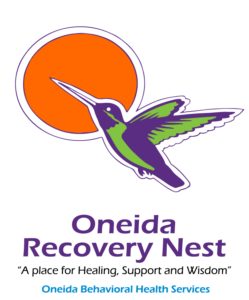 Recovery Coaches provide support and help participants establish a plan for life in recovery. The recoveree is responsible for directing their wants and desires including meeting their basic needs with meaning and purpose to work on goals with housing, employment and personal development. Peer Recovery Coaching assists recoverees in person, by phone and in the community setting before, during and after treatment services. A coach helps the recoveree by:
Recovery Coaches provide support and help participants establish a plan for life in recovery. The recoveree is responsible for directing their wants and desires including meeting their basic needs with meaning and purpose to work on goals with housing, employment and personal development. Peer Recovery Coaching assists recoverees in person, by phone and in the community setting before, during and after treatment services. A coach helps the recoveree by:
- Identifying recovery concerns
- Providing support tools needed to empower the individual
- Helping develop and expand on the recoveree’s strengths
- Establishing realistic goals focusing on the recoveree’s talents and skills
- Connecting them with support services to help them succeed in recovery
Please click here to learn more about the Recovery Coaches at Oneida Behavioral Health. Coaches are listed near the end of the second column.
Following are meetings/resources available at the Oneida Recovery Nest that can help you or your loved ones navigate a path to recovery:
- Nar-Anon for loved ones of addicts, Tuesdays:
5:30 p.m. newcomers welcome
6:00 – 7:00 p.m. meeting - Beading Circle Support, Tuesdays:
6:00 – 8:00 p.m.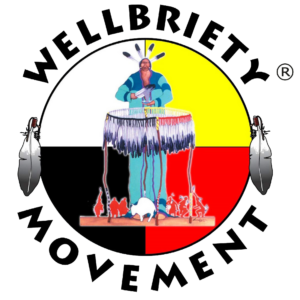 Located inside the kitchen-area (left door)
Located inside the kitchen-area (left door) - Native AA FIRESIDE meeting, Wednesdays:
6:00 p.m. meeting
Meeting will be held inside during inclement weather - Wellbriety Recovery Talking Circle, Thursdays:
6:00 p.m.
Located inside the Oneida Recovery Nest
The meetings listed above are held at the Oneida Recovery Nest, 1240 Packerland Drive #2 in Green Bay. For more information, please call: (920) 490-3950 or email RecoveryCoach@oneidanation.org.
What is Recovery Coaching
Oneida Recovery Nest
Recovery Nest Meetings and Activities
Nar-Anon Flyer
Wellbriety Flyer
Please click here for an extensive list of substance use resources.
Recovery Coach Training
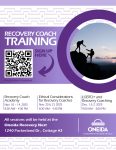 Recovery Coaches provide support and help participants establish a plan for life in recovery. The Recovery Coach Academy focuses on providing individuals with the skills needed to guide, mentor and support anyone who would like to enter into or sustain long-term recovery. Are you interested in becoming a Recovery Coach? View the flyer here. For additional information or questions please contact Hallie Volkman at hvolkman@heliosrecovery.com.
Recovery Coaches provide support and help participants establish a plan for life in recovery. The Recovery Coach Academy focuses on providing individuals with the skills needed to guide, mentor and support anyone who would like to enter into or sustain long-term recovery. Are you interested in becoming a Recovery Coach? View the flyer here. For additional information or questions please contact Hallie Volkman at hvolkman@heliosrecovery.com.
Visit this link to register for the upcoming trainings.
NARCAN Training
To help prevent an opioid overdose, OBH has NARCAN® kits and fentanyl test strips available during its regular business hours of 8:00 a.m. to 4:30 p.m., Monday through Friday. Our office is located at:
2640 West Point Road
Green Bay, WI 54301
PH: (920) 490-3790
NARCAN®, also known as naloxone, is an opioid antagonist and is used to reverse the effects of an opioid overdose. It is usually given by a caregiver or loved one if they think an opioid overdose has occurred.
Register and take the NARCAN® pre-test
IMPORTANT: Administering NARCAN® is not a substitute for emergency medical care for opioid overdose. After NARCAN® has been given, you should immediately call 911 or your local emergency number. It’s also important to note, that NARCAN® will not counteract xylazine, which is not an opioid.
Click below to view the Narcan Training Materials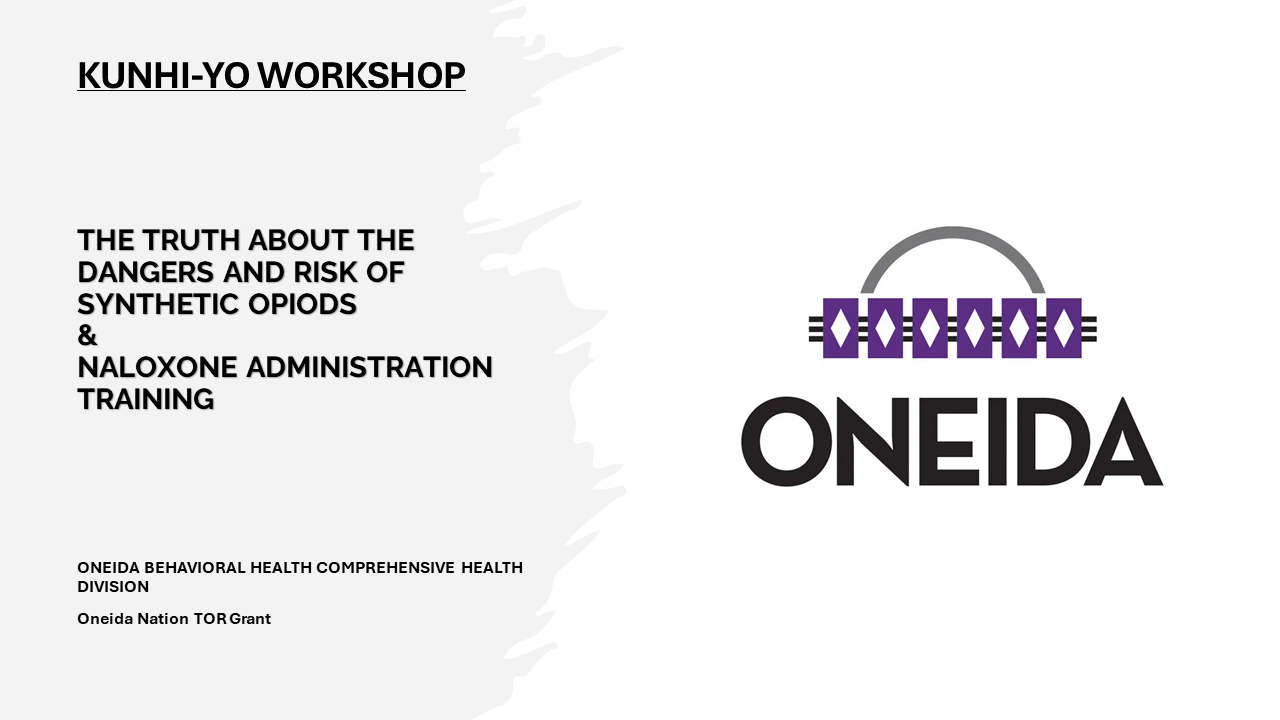
Narcan Training – Part 1
Synthetic Opioids and their Risks
Narcan Training – Part 2
What You Should Know About Xylazine
Narcan Training – Part 3
Nitazenes: The Deadliest Drug You’ve Never Heard Of
Narcan Training – Part 4
Narcan Nasal Spray – How to Use
Narcan Training – Part 5
Fentanyl Test Strip 2.0 (Liquid/Powder)
Narcan Training – Part 6
What is Good Samaritan Law?
Narcan Training – Part 7
Click here to take the NARCAN® post-test
Fentanyl test strips can help those using drugs detect the presence of fentanyl in different drug forms, such as pills, powder and injectables. It takes as little as two salt-sized grains of fentanyl to kill someone. Within minutes, someone using the test strips can know whether the drug they are about to take contains fentanyl.
Instructions for using the test strips are available by clicking here.
Xylazine Test Strips Available
Xylazine test strips can be used to detect the presence of xylazine in various drugs including pills, powder and injectables. It is virtually indetectable otherwise, being that you can’t see it, taste it or even smell it. As little as 0.04 grams of Xylazine can become toxic to humans, and repeated use can lead to deadly necrotic skin wounds. With xylazine test strips, someone can know within minutes if the drug they are about to take contains xylazine.
Xylazine test strips are now available through Oneida Behavioral Health at (920) 490-3790. Instructions for using the test strips are available by clicking the link below.
What is Medication Assisted Treatment (MAT)
Medication Assisted Treatment (MAT) is an evidence-based treatment approach designed to support individuals working to overcome substance use disorders. MAT combines medication with counseling and behavioral therapies to address the complex needs of individuals, offering a comprehensive, holistic approach to recovery. It is recognized for its effectiveness in helping people achieve long-term sobriety, improve quality of life and reduce the risk of relapse.
How MAT Works
MAT focuses on the use of medications that can help ease withdrawal symptoms, reduce cravings and stabilize individuals, making it easier for them to engage in counseling and other therapeutic activities. Common medications used in MAT include:
- Buprenorphine (Suboxone): Used for opioid addiction to help reduce withdrawal symptoms and cravings.
- Naltrexone: Used for both opioid and alcohol addiction, it blocks the effects of opioids and reduces the desire to drink.
- Methadone: A long-acting medication that helps control opioid withdrawal and cravings (OBH does not currently offer Methadone but can refer patients to a provider that does).
In addition to medication, MAT includes therapy and counseling services that focus on the psychological aspects of addiction, helping individuals understand and address the root causes of their substance use disorder.
Who Can Benefit from MAT?
MAT is suitable for individuals who are struggling with:
- Opioid use (e.g., heroin, prescription painkillers)
- Alcohol use
The program offers a supportive, non-judgmental environment where individuals can begin their journey to recovery at their own pace.
Why MAT Matters
MAT has been shown to significantly improve the success rate of recovery by addressing both the physical and psychological components of addiction. By reducing cravings and withdrawal symptoms, MAT helps individuals focus on rebuilding their lives and re-engaging with family, work and community.
Studies have shown that MAT can reduce the risk of overdose, improve retention in treatment and reduce criminal behavior associated with substance use. It is an essential tool in recovering from opioid and alcohol use.
Getting Started with MAT
If you or someone you know is struggling with opioid or alcohol use, MAT can provide the support and care needed for recovery. Access to MAT often includes:
- Same Day Substance Abuse Care: Available Monday through Friday from 8:00 to 10:00 a.m.
- Ongoing support: Including counseling, therapy and follow-up care to ensure a holistic recovery journey
Taking the first step toward recovery can take courage, but with MAT, individuals are equipped with the tools and support necessary to reclaim their lives. Together, we can build a stronger, healthier community with the resources and support necessary to overcome substance use.
Safe Medication Disposal
Keeping unused medications in your home may seem harmless, but they can be misused by family members, friends or others. Throwing medications in the trash or flushing them can lead to even greater risks, including groundwater contamination. It is extremely important to prioritize the safe disposal of unused or expired medications.
Permanent Drug Drop Box
Using a permanent drug drop box ensures that medications are disposed of safely. It’s a simple step you can take to promote a healthier and safer Oneida. Oneida Police Department has a permanent drug drop box at 2738 Freedom Road in Oneida. It is located near the front entrance. The drug drop box accepts a wide range of medications, including:
- Prescription and over-the-counter capsules, pills and liquids (in their original containers)
- Creams, ointments, patches and inhalers
- Non-aerosol sprays and vials
- Pet medications
- Vape pens and e-cigarette devices (only if batteries are removed)
Medication Disposal Pouches
In addition to the drug drop box, another option is now available to Oneida Nation members, medication disposal pouches. These small pouches contain a liquid mixture—typically a charcoal-based solution—that effectively neutralizes medications when placed inside. They are simple and convenient to use, with instructions found here.
Medication disposal pouches are currently available at Oneida Behavioral Health. Additional distribution options could be added in the future.
Let’s Take Action Together
Disposing of medications safely helps prevent misuse, accidental poisoning and environmental harm. By using the permanent drug drop box at the Oneida Police Department or a prescription destruction pouch, you’re helping to keep our community safe. For more information, please contact Oneida Behavioral Health at (920) 490-3790.
What If I Need Detox?
What is detox?
Detox is the process of clearing drugs or alcohol from the body. When someone uses a substance repeatedly over time, the body can develop a physical dependence on it. When someone stops using the substance after regular use, they may experience withdrawal symptoms, ranging from mild discomfort to life-threatening complications, depending on the substance and individual health factors.
How long does detox take?
The time it takes for the body to detox varies based on the substance, the frequency of use and individual health. Here’s a general overview:
Stimulants: Symptoms may appear within hours to a couple of days
Opioids: Withdrawal begins within 6 to 12 hours and lasts up to a week
Long-acting opioids: Symptoms may be delayed 2 to 4 days and last longer
Alcohol/sedatives: Symptoms can begin within hours or be delayed for several days, sometimes lasting weeks
Types of detox
Social (Non-medical) Detox: Offers support without medication
Medical Detox: Involves 24/7 supervision and medications to manage withdrawal safely. Recommended for substances like alcohol, opioids and benzodiazepines
Assessing the need for a medical detox facilinty
While Oneida Behavioral Health does not have a medical detox facility, we do coordinate admission to a medical detox facility for those who meet certain requirements. Providers at OBH will assess individuals using the Clinical Institute Withdrawal Assessment Alcohol Scatle Revised (CIWA-AR) or the Clinical Opiate Withdrawal Scale (COWS). These are assessment tools used by medical professionals to assess and diagnose the severity of alcohol withdrawal and to rate common signs and symptoms of opiate withdrawal. The provider then ensures that funding sources, such as insurance or PRC, will cover this service.
How do I begin the detox process?
If an individual is ready to begin the detox process, following are the steps they can take.
- Visit Oneida Behavioral Health anytime between 8:00 a.m. until 4:30 p.m., and triage can help you begin the process. Or, see your physician at the Oneida Community Health Center.
- You’ll be screened by a triage counselor to see if you meet the criteria for medical detox. If so, they will coordinate care by checking available placement and funding. If not, they will connect you with a Substance Abuse Counselor at OBH who can make treatment recommendations, which could include some combination of medication assisted treatment, individual or group counseling and peer support.
- To begin the detox process, you can also go directly to one of the following local hospitals:
- Bellin Health
- Vincent’s Hospital
- Mary’s Hospital
- St. Elizabeth’s Hospital
- Willow Creek Behavioral Health
- Brown County Comprehensive Treatment Center
In order to coordinate funding, each patient will have to be eligible for Purchased Referred Care. More information about PRC can be found here.
If you’re taking the first step toward recovery, please know that you are not alone. Providers at Oneida Behavioral Health are here to support you with compassion, respect and guidance every step of the way.
If you think you may need help with detox, or you’re unsure where to begin, we encourage you to reach out. Our team is ready to listen, assess your needs and help connect you with the care and resources that are right for you.
Healing is possible. We’re here to help you get there.

